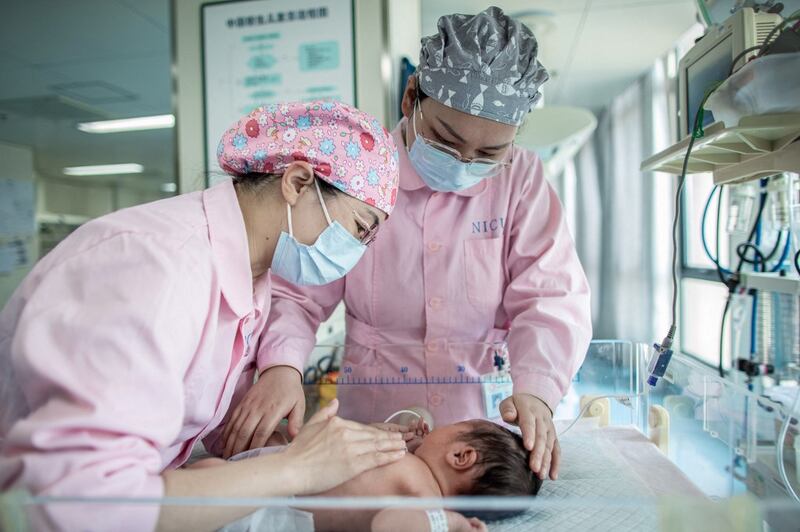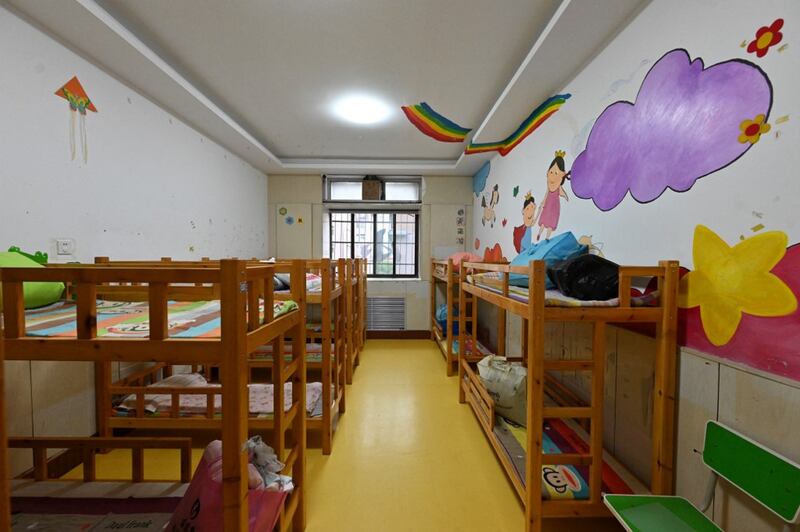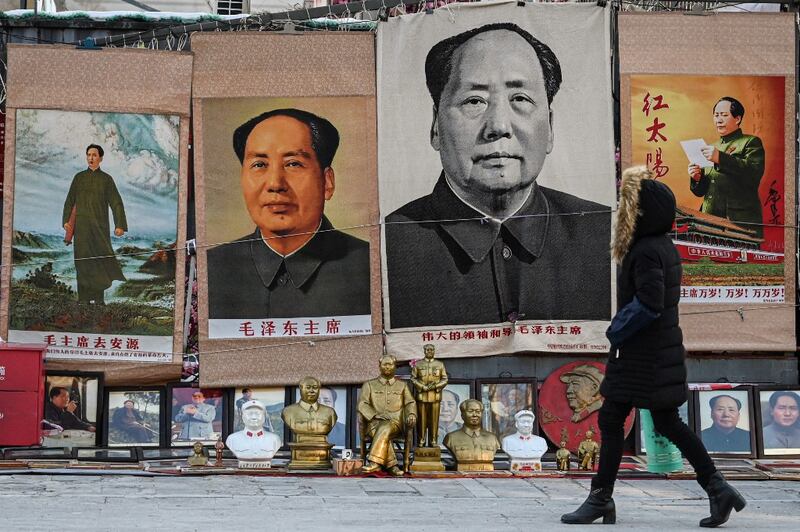Read coverage of this story in Mandarin here and here.
Faced with plummeting birth rates, nationwide kindergarten closures and young people who are increasingly choosing to stay single, authorities in China have announced incentives to encourage people to have kids, calling for “a new marriage and childbearing culture.”
China’s cabinet, the State Council, published a slew of measures on Monday, including childbirth subsidies, better healthcare for mothers and children, and comprehensive childcare services.
Officials at all levels of government should “actively build a new marriage and childbearing culture and carry forward the traditional virtues of the Chinese nation, advocating ... marriage and childbearing at the right age,” the announcement said.
Communist Party leader Xi Jinping has called on women to focus on raising families, and the National People’s Congress has been looking at ways to boost flagging birth rates and kick-start the shrinking population, including flexible working policies, coverage for fertility treatment and extended maternity leave.
But young women in today’s China are increasingly choosing not to marry or have kids, citing huge inequalities and patriarchal attitudes that still run through family life, not to mention the sheer economic cost of raising a family.
Officials should “vigorously promote positive views of marriage, relationships, childbearing, and family" and build online matchmaking and dating services to help young people to find partners, while getting rid of “lavish weddings and high bride prices,” the State Council directive said.
The measures come after the Ministry of Education reported a 5% fall in the number of kindergartens last year, with more than 14,800 closures, marking the second year of decline.
Kindergarten enrollments fell by 5.35 million in 2023, a decrease of 11.55% from 2022, the ministry said in figures widely reported by Chinese media.
Live births fell from 17.86 million in 2016 to just 9.02 million in 2023, with birth rates plummeting from 1.77 per woman in 2016 to around 1.0 in 2023, placing the country second from bottom among the world’s major economies.
Global trend
Peng Xiujian, a senior researcher at Australia’s Victoria University, said low fertility rates are part of a global trend, especially in Asia, where young people are generally unwilling to have children.
The new measures “will be slow to take effect, and it is impossible to change people’s willingness to have children all at once,” Peng said.
The State Council said it would extend maternity leave from 98 days to 158 days, which would attract a maternity allowance in more than half of China’s provinces, and allow childcare tax allowances of up to 2,000 yuan (US$280) a month, while calling on local governments to expand and subsidize local childcare services.

But Peng said there are still huge barriers for women in the workplace who want to have families, and that issues like discrimination, flexible working and a working culture that is heavily focused on long hours would need to be addressed first.
Jessica Nisén, a demographer at the University of Turku in Finland, said the latest measures would be “very good” for couples who already have children or who have already decided they want them.
But she added, “building a new marriage and childbearing culture will surely be difficult though,” calling for more radical policies offering the same amount of leave to each parent to encourage shared responsibility.
She said the measures could have a “non-marginal” effect in the long term, but said the government needs to demonstrate it is committed to gender equality rather than just setting top-down targets for how many children should be born.
A millennial who declined to be named for fear of reprisals said that women’s rights in the workplace, affordable medical care and the cost of educating a child all need to be taken into account before more women will even consider having kids.
“The subsidies China is offering right now wouldn’t even make up one-tenth of the total cost of educating a child,” she said. “Perhaps if they covered all of the costs of prenatal checkups and childbirth, it would look as if they were a bit more serious about this.”
Recovery unlikely
Tomáš Sobotka, deputy director of the Vienna Institute of Demography, said the long-term recovery of birth rates looked unlikely in the current economic climate, citing high youth unemployment and “competitive or uncertain labor market prospects for many.”
He said ideological slogans like “a new marriage and childbearing culture” would have little practical effect and could even have the opposite effect.

“Government efforts in trying to exhort younger generations to form a family may meet with resistance from the young people who are alienated by their poor future prospects,” Sobotka told RFA Mandarin in a recent interview.
He said universal benefits like cheap childcare weren’t outlined in the policy, yet tax breaks would only be an incentive for more affluent couples.
“The new policies do not manage to address the broader perception of uncertainty, pressures, and lack of confidence about the future among the young generations today, which are driven by a mix of past experiences (such as COVID lockdowns and uncertainties), ... unaffordable housing in large cities, miserable labor market prospects, and the economic squeeze that is hitting young adults the most,” he said.
“Until these issues are at least partly addressed, birth rates will not recover much.”
Martin Whyte, professor emeritus of sociology at Harvard University, said the ruling Chinese Communist Party’s claim to legitimacy as a government has been undermined by the falling birth rates.
“There was a general assumption that the party and state in China were managing society quite well and successfully, and that the Chinese people were benefiting from that,” Whyte told RFA Mandarin in a recent interview. “And now, I think it’s likely that, if there’s some new campaigns or whatever, people are much more likely to be skeptical or even critical.”
He said the campaigns to create a “new childbearing culture” could also backfire.
“Some of these things Xi Jinping claimed, such as to find ways for women to have more babies, are clearly creating derision in China,” he said. “Young people and women, in particular, think this is absurd, and that Xi Jinping is completely out of touch with reality.”
“The society Chinese are living under does not produce a situation in which it would make sense to have three babies,” Whyte said, adding that the coercive nature of Xi’s three-year zero-COVID policy had undermined his legitimacy in the eyes of many in China.

“[There are] also other things like the housing sector crisis,” he said. “China produced incentives for local governments and developers to build a lot more housing than was actually needed. And then with population shrinking… where is the competence of the party-state in allowing that to happen?”
‘A very different place’
Alicja Bachulska, a policy fellow at the European Council on Foreign Relations, agreed.
“I would say ... in 2023 we have felt a lot of frustration, a lot of disillusionment,” she said in a YouTube debate with Bonnie Glaser of the German Marshall Fund of the United States. “[The] Chinese authorities [are] making quite arbitrary decisions that are not perceived any more in some circles as very rational.”
“I think that the end of the zero-COVD policy, the street protests that took place in China at the end of 2022 made many people realize that the level of frustration related to the way Chinese political elites operate at the moment had started to be really, really big,” she said.
This also has an effect on Beijing’s attempts to boost the birth rate, Bachulska said.
“For China, the solution is to convince most young women in China, well-educated middle class urban women, to have more children, and they are really trying hard to build this positive energy idea of how the demographic crisis in China will be turned into an opportunity,” she said. “But then on the other hand you have a huge crackdown on the feminist movement.”
She said women in China are in “a very different place” despite being unable to organize, and were unlikely to go along with the authorities' campaign for more children.
Translated by Luisetta Mudie. Edited by Roseanne Gerin.
